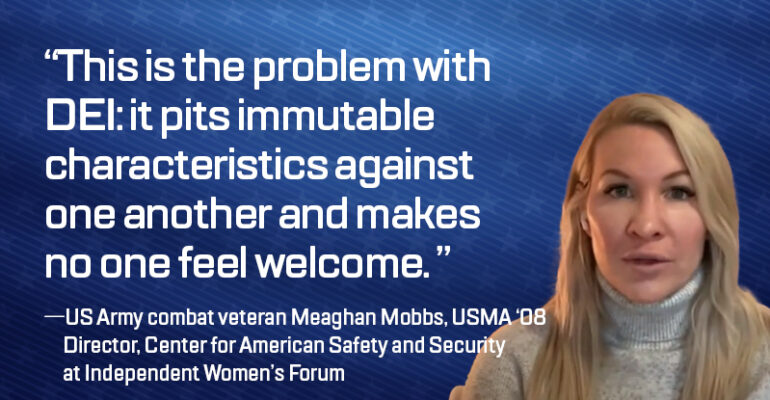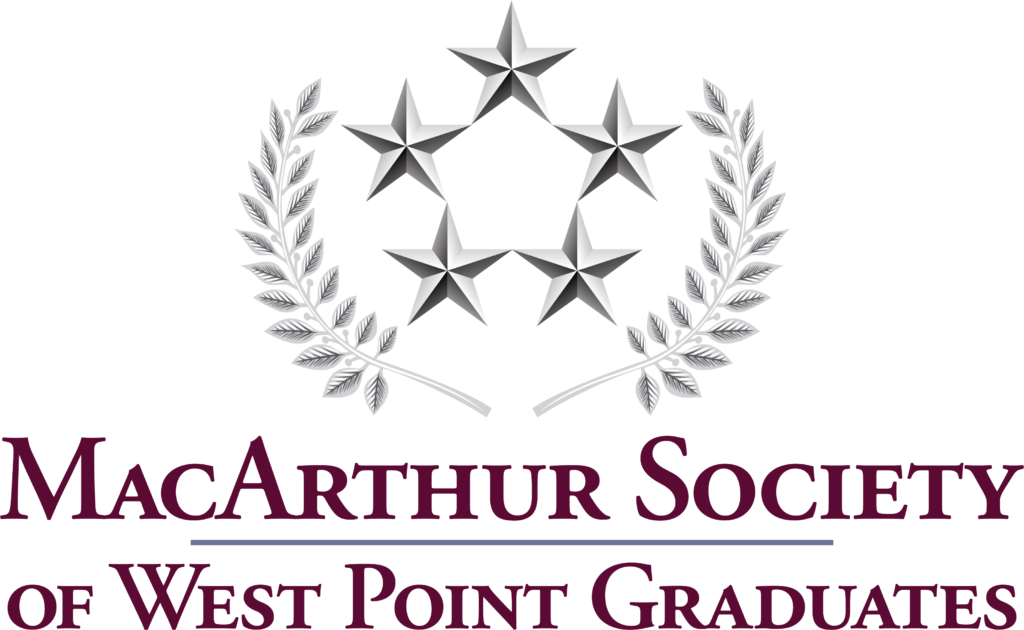DEI’s Impact on our Military with West Point Grad Meaghan Mobbs
23 November 2024 2025-03-17 18:38DEI’s Impact on our Military with West Point Grad Meaghan Mobbs
By Patrice Onwuka | Philanthropy Roundtable
America’s military has been known as the greatest in the world, but over the last 20 years mission readiness has been replaced by prioritizing DEI (diversity, equity and inclusion) initiatives at the highest levels.
DEI programs expanded under President Joe Biden with Pentagon DEI programs accounting for $68 million for FY 2022, $86.5 million for FY 2023 and a staggering $114.7 million for FY 2024. No amount of funding or rebranding has been able to bring up abysmal recruitment levels, which are the lowest we have seen in decades.
“The outcome has been that white men have stopped showing up because outreach and engagement were focused on women or minorities in the hopes of boosting those numbers and they felt like they weren’t being recruited or even welcomed,” says combat veteran Meaghan Mobbs,
director of the Center for American Safety and Security at Independent Women’s Forum and the president of the Romulus T. Weatherman Foundation.
Mobbs was appointed in June 2022 by Gov. Glenn Youngkin to the Virginia Military Institute’s (VMI) Board of Visitors. She is a proud graduate of West Point and a former paratrooper and combat veteran. She earned a master’s degree in forensic psychology from George Washington University. She has a doctorate in clinical psychology from Columbia University, where her work focused on the psychosocial impact of an all-volunteer military and the role of transition stress in the lives of military veterans.
Recently, Roundtable Adjunct Senior Fellow Patrice Onwuka spoke with Mobbs about diversity, equity and inclusion at VMI and its effect on military recruitment and retention.
The interview below has been edited for length and clarity.
Q: Tell us about yourself and your amazing background, especially as a paratrooper.
Mobbs: I’m the daughter of two paratroopers. My father served for 36 years and my mother was actually one of the first women to go to airborne school. And so I grew up close to this idea of service and sacrifice. It also instilled a powerful lesson that if women met the standard, they could achieve whatever they wanted within the military.
My father was in the Pentagon on 9/11. I was in high school, and it completely changed the trajectory of my life like so many people who had a loved one who was in the buildings that were attacked. I graduated and went to West Point and was keen to be a paratrooper because both my parents were. That’s how I found myself in North Carolina, serving with the 82nd Airborne Division and eventually deploying to Afghanistan in support of Operation Enduring Freedom.
Q: What is your perspective on this idea that there needs to be gender parity across the military? For example, should all young women be forced to register for the draft?
Mobbs: If you meet a standard, whatever that standard is, once it is established regardless of your immutable characteristics, then you should be allowed or afforded the opportunity to participate in that job.
There are nuances, though. I don’t necessarily think that we are at the point where women should be serving in all-male infantry units for a variety of reasons unrelated to standards. But I deeply believe that standards have to be upheld, and there shouldn’t be two standards. Ultimately, if you are in combat, whether or not you can do the job is the deciding factor. Not whether you’re a man or a woman.
And the reason is that ultimately, when women are given jobs in the military, there are oftentimes these two different standards, and then women are looked at as not being as capable or as qualified.
That’s the most dangerous aspect of DEI; it eradicates trust and faith that the other person standing next to you is competent or deserves to be there. And when you have that erosion of trust, especially in the military, it can make it very difficult to do your job.
Q: On ending affirmative action in higher education, I believe VMI and other military schools were exempted from the Supreme Court decision last year. Any thoughts on what that decision has meant for the institute?
Mobbs: In the military and at the academies, we’re struggling with recruitment and retention. All higher education institutions are experiencing a cliff of not having enough people come to their institutions. Schools are competing for the same pool of candidates, and there’s been fear that in the military, and in particular at the academies, there would be a very significant dip in the demographic of people wanting to be a part of VMI or the military itself.
The outcome has been that white men have stopped showing up because outreach and engagement were focused on women or minorities in the hopes of boosting those numbers and they felt like they weren’t being recruited or even welcomed.
As a result, we experienced a massive dip in admissions at VMI.
The issue wasn’t that we were doing poorly with women or minorities. It’s that we weren’t recruiting white men, the largest demographic we needed to be successful.
This is the problem with DEI: it pits immutable characteristics against one another and makes no one feel welcome.
The military is a collective institution, and you must find a way to overcome all of these other things to build a cohesive structure.
Q: So, how has VMI responded?
Mobbs: We’ve rapidly expanded our outreach and completely overhauled our admission system. The massive failure of the Federal Student Aid FAFSA rollout by the Biden administration ultimately impacted the people that have the most need—low socioeconomic status, single-parent homes. Even so, we have a crack shot admissions team now, and they were able to navigate these issues.
Q: Should the military be purely based on merit, or is there room for this kind of kaleidoscope of experiences and backgrounds that really add to a “diverse” military force?
Mobbs: You can have … your cake and eat it too.
The military should ultimately be a meritocracy. You should be promoted based on your ability to perform your job function to the best of anyone else around you.
That’s the meritocracy piece. And I think that we have enough people meeting those standards with very interesting backgrounds or “cognitive diversity,” something we should elevate more.
Q. What does true diversity mean to you?
Mobbs: It’s the idea that diversity is not necessarily related to gender, ethnicity or race. There are pieces of diversity that are critical but get overlooked by the current DEI infrastructure.
One of those is cognitive diversity, and that’s the ability to problem solve differently: to see something and be able to turn it in your mind in different ways and come to different conclusions. In certain military units, it is and should be highly prized.
Over time, we’ve built into this idea that there is not a meritocracy anymore, that there are quota secret systems. Whether it’s true or not, that perception exists.
Q: You’ve testified before Congress recently on behalf of Independent Women’s Forum about how this impacts recruitment for the broader military and how recruitment challenges have made military less ready. Please explain.
Mobbs: Let’s be clear: DEI infrastructure in the military exists. There’s been funding for it. There are positions in the military that are titled diversity, equity and inclusion, whether it’s a specialist or an additional duty or responsibility. They are permitting this type of stratification of people based on different immutable characteristics. That is where the danger lies.
Recruitment for the military is a catastrophic problem for a variety of reasons. We have mental health problems among our younger population that make them not qualified or capable of serving. We have an obesity crisis; we don’t have people that are healthy enough physically to serve in our military. We have an education issue where people aren’t able to meet the educational standards necessary to enlist in the military.
So, we have all of those things. And then I think there’s also the perception that the military is no longer doing what it should be doing, which is fighting and winning our nation’s wars. That does have an impact on morale.
Veterans, who previously were children of veterans, were a guaranteed demographic for service. It’s no longer the case. Most veterans are not recommending military service to their children for a variety of reasons. Some of it is the perception that the military is becoming a social experiment. They are asking themselves, why would I want my children to be part of that?
Q: Are you seeing any encouraging signs that the military recognizes what’s going on and will start to change?
Mobbs: The recruitment crisis got so catastrophic that the Army quietly revised their recruitment numbers so they looked like they made goals when they didn’t. That’s a huge problem.
However, there was a complete shift of recruitment strategy over the last year. They brought back the “be all you can be” slogan.
They produced new recruitment commercials and social media videos that promote a more masculine, aggressive tone with a focus on the military and military skills. There is no social component to it.
They also just instituted medical waivers for issues affecting young people. ADHD, for example. They are testing whether that issue can be waived to welcome those with that diagnosis who previously were disallowed to serve. They’re recognizing they have to widen the net. Whether or not that is the right solution is another question.
Finally, the incoming administration has already discussed many things they’re planning for the military. There will likely be a purge of senior leadership, the reinstitution of accountability, a large investment into the Department of Defense and eradicating DEI. Those things combined will lead to a bump in recruitment and retention.
Q: What is your message about the role of philanthropy in addressing veterans’ needs?
Mobbs: Any philanthropists who want to be involved in the veteran space should take a hard look at what we’ve done to veterans in our Veterans Administration (VA) system. We have effectively told veterans that we will pay them to stay sick when it comes to psychological disorders in particular.
I did my residency at the VA. The way that we currently do compensation and pension evaluations for veterans creates a disincentive to helping them get better. And the way that we tell them they don’t have to seek treatment; we’re just going to pay them forever is not a way to thank a veteran for their service.
A reckoning at the VA system will truly show veterans that we value their service and what they’ve done for our country. A recalibration of how we go about investing in veteran programs and how the VA is providing veteran services is the best and most important way that we can honor our veterans.
First published on Philanthropy Roundtable



















